
Muenster Journal of Mathematics
Scope & Guideline
Bridging theory and application in the world of mathematics.
Introduction
Aims and Scopes
- Operator Algebras:
The journal frequently publishes research on C*-algebras, von Neumann algebras, and their applications, exploring both foundational aspects and advanced topics such as crossed products and noncommutative geometry. - Geometric and Topological Methods:
There is a consistent focus on the interplay between geometry and topology, particularly in relation to algebraic structures, including the study of manifolds, groupoids, and their invariants. - Representation Theory:
The journal covers representations of various algebraic structures, including spherical representations and group actions, which connect algebra with geometry and topology. - Homological and Cohomological Techniques:
Research published in the journal often employs homological methods, particularly in the context of group cohomology, index theory, and derived categories, highlighting the algebraic underpinnings of topological spaces. - Quantum Mathematics:
The journal explores mathematical aspects of quantum theory, specifically through the lens of operator algebras and quantum groups, contributing to the understanding of quantum spaces and their properties.
Trending and Emerging
- Noncommutative Geometry:
There has been a significant increase in publications related to noncommutative geometry, particularly through the study of quantum algebras and their connections to classical geometric concepts. - C*-Algebras and Their Applications:
The journal has seen a surge in research focused on C*-algebras, especially in relation to their applications in quantum physics and operator theory, indicating a broader interest in their structural properties and classifications. - Algebraic Group Actions:
Emerging themes include the study of algebraic groups acting on various geometric structures, highlighting the relevance of group actions in understanding geometric properties and symmetries. - Homotopy Theory and Derived Categories:
Research that connects homotopy theory with derived categories is gaining traction, reflecting a contemporary interest in using these tools to explore complex algebraic structures. - Higher Dimensional Algebraic Structures:
There is a growing focus on higher-dimensional algebraic structures, such as higher categories and their applications in topology and algebra, showcasing a trend towards more abstract mathematical frameworks.
Declining or Waning
- Low-Dimensional Topology:
Research specifically focusing on low-dimensional topology and its applications appears to be less frequent in recent publications, suggesting a shift towards more abstract and generalized algebraic structures. - Classical Differential Geometry:
There is a noticeable decrease in articles dealing with classical differential geometry, possibly as the journal's focus shifts towards more modern and abstract approaches in geometry and topology. - Pseudodifferential Operators:
Recent issues show a decline in discussions surrounding pseudodifferential operators, indicating a potential move away from classical analysis topics in favor of more contemporary algebraic and categorical approaches. - Random Walks and Dynamical Systems:
Topics related to random walks and classical dynamical systems have become less prominent, suggesting a potential trend towards more deterministic and algebraically structured systems.
Similar Journals

Korean Journal of Mathematics
Elevating the Standards of Mathematical Scholarship.The Korean Journal of Mathematics, published by the Kangwon-Kyungki Mathematical Society, is an esteemed platform dedicated to advancing the field of mathematics. With an ISSN of 1976-8605 and E-ISSN of 2288-1433, the journal features a range of scholarly articles that emphasize both theoretical and applied aspects of mathematics, catering to researchers, professionals, and students alike. Although it is not open access, the journal maintains a commitment to academic rigor and integrity, ensuring high-quality contributions to the mathematical community. As it converges from years 2021 to 2024, the Korean Journal of Mathematics is poised to enhance its visibility within the Scopus database, currently ranking #354 out of 399 in the general mathematics category, reflecting its potential for growth and impact in the mathematical sciences. With its strategic focus and institutional backing from Kangwon National University, the journal serves as a vital resource for fostering research and dialogue in the ever-evolving landscape of mathematics.
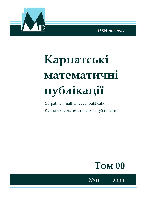
Carpathian Mathematical Publications
Catalyzing Collaboration in the Mathematical Community.Carpathian Mathematical Publications, published by Vasyl Stefanyk Precarpathian National University, stands as a significant contribution to the field of mathematics, particularly highlighted by its Q2 ranking in Mathematics (miscellaneous) for 2023. With an ISSN of 2075-9827 and E-ISSN of 2313-0210, this Open Access journal, initiated in 2009, enables researchers and practitioners worldwide to freely access cutting-edge mathematical research, thus promoting knowledge sharing and collaboration. Based in Ivano-Frankivsk, Ukraine, the journal focuses on a broad spectrum of mathematical topics while fostering innovative approaches and interdisciplinary connections within the mathematical community. Its current Scopus ranking of rank #122 out of 399 reflects its growing influence and importance, making it an ideal platform for scholars and students aiming to advance their research and stay abreast of the latest developments in general mathematics.

MICHIGAN MATHEMATICAL JOURNAL
Fostering Collaboration in Cutting-Edge Mathematical ResearchThe MICHIGAN MATHEMATICAL JOURNAL is a prestigious and influential publication in the field of mathematics, founded by the University of Michigan. With an ISSN of 0026-2285 and an E-ISSN of 1945-2365, this journal is recognized for its high-quality research and has achieved a commendable Q1 ranking in the category of Mathematics (miscellaneous) as of 2023. Published by the esteemed Michigan Mathematical Journal, it provides a platform for the dissemination of innovative mathematical theories and findings, playing a crucial role in advancing knowledge and scholarship within the mathematical community. With coverage spanning from 1996 to 2024, the journal emphasizes rigorous theoretical development and fosters collaboration among researchers, professionals, and students alike. While not an open-access journal, its contributions are invaluable for those looking to stay abreast of cutting-edge mathematical research.
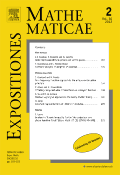
EXPOSITIONES MATHEMATICAE
Connecting Scholars Through Mathematical InsightsEXPOSITIONES MATHEMATICAE, published by Elsevier GmbH, stands as a significant journal in the realm of mathematics, catering primarily to researchers, professionals, and students. With an ISSN of 0723-0869 and an E-ISSN of 1878-0792, this journal has made its mark in the academic community, boasting a Q2 classification in the miscellaneous mathematics category for 2023, illustrating its prominence within its field. The journal addresses a diverse scope of mathematical topics, encouraging the publication of original research and innovative theories while maintaining rigorous academic standards. As it converges from 2004 to 2024, EXPOSITIONES MATHEMATICAE continues to be an essential resource for advancing mathematical knowledge and fostering scholarly communication, despite being a non-open-access publication. Its location in Munich, Germany further anchors it within a rich intellectual tradition, providing accessibility for the mathematical community worldwide.
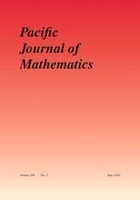
PACIFIC JOURNAL OF MATHEMATICS
Advancing Mathematical Inquiry Since 1951The PACIFIC JOURNAL OF MATHEMATICS, established in 1951 and published by Mathematical Sciences Publishers, is a premier peer-reviewed journal in the field of mathematics, renowned for its rigorous scholarship and impactful research contributions. With an HIndex that reflects its sustained academic influence, this journal has been categorized within the Q1 quartile in the field of mathematics (miscellaneous) as of 2023, showcasing its position among the top-tier mathematics journals globally. Although the journal operates under a traditional subscription model rather than an Open Access format, it remains dedicated to disseminating original research that spans various domains within mathematics. Researchers, professionals, and students alike will find the journal's breadth of topics and commitment to quality work instrumental in advancing their understanding and exploration of mathematical concepts. This esteemed journal continues to thrive as a vital resource for the mathematical community through its comprehensive collection of articles from a diverse range of mathematical disciplines, thus maintaining a significant role in shaping the future of mathematical inquiry.
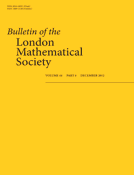
BULLETIN OF THE LONDON MATHEMATICAL SOCIETY
Empowering the Mathematical Community with Quality ResearchThe BULLETIN OF THE LONDON MATHEMATICAL SOCIETY, published by Wiley, is a distinguished journal that serves as a vital resource in the field of mathematics. With its ISSN 0024-6093 and E-ISSN 1469-2120, this journal has consistently provided a platform for innovative research and scholarly discourse since its inception in 1969. Recognized for its quality, it currently holds an impressive Q1 ranking in the mathematics category, a testament to its significance in disseminating influential findings and trends in the mathematical sciences. Researchers and practitioners can rely on the BULLETIN for its comprehensive coverage of both theoretical and applied mathematics, which caters to a diverse audience ranging from professionals to students alike. Though it does not currently offer Open Access options, its articles can be accessed through institutional subscriptions, ensuring that significant works reach the academic community effectively. With contributions that span over five decades, the journal continues to shape mathematical research and inspire future advancements in the discipline.

INDIAN JOURNAL OF PURE & APPLIED MATHEMATICS
Cultivating Knowledge in the Mathematical SciencesINDIAN JOURNAL OF PURE & APPLIED MATHEMATICS, published by the INDIAN NATIONAL SCIENCE ACADEMY, stands as a vital resource in the realm of pure and applied mathematics since its inception in 1996. With ISSN 0019-5588 and E-ISSN 0975-7465, this journal aims to disseminate original research that advances the understanding and application of mathematical principles. Operating out of New Delhi, India, it serves a diverse readership comprising researchers, scholars, and practitioners in the mathematical sciences. Recognized within the Q3 category in both Applied Mathematics and Miscellaneous Mathematics as per the 2023 category quartiles, the journal emphasizes rigorous peer-reviewed articles that contribute to its impact in academia, reflected in its Scopus rankings. Although it does not currently operate as an open-access journal, it maintains a commitment to quality and accessibility of scholarly content, striving to foster academic collaboration and innovation. The convergence of full-text issues from 1996 to 2024 highlights its ongoing dedication to the evolution of mathematical research.
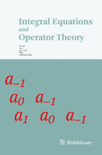
INTEGRAL EQUATIONS AND OPERATOR THEORY
Fostering collaboration in mathematical research.INTEGRAL EQUATIONS AND OPERATOR THEORY, published by SPRINGER BASEL AG, stands at the forefront of research in the fields of algebra, number theory, and analysis, with an esteemed categorization of Q2 in both disciplines as of 2023. With its ISSN 0378-620X and E-ISSN 1420-8989, this journal not only maintains a rigorous standard for scholarly contributions but also offers a vital platform for discourse on theoretical and applied aspects of integral equations and operator theory. Established in 1978, it has nurtured academic growth and innovation, with contributions continuing up to 2024. The journal holds respectable Scopus rankings, placed 43rd out of 119 in Algebra and Number Theory, and 110th out of 193 in Analysis, establishing its relevance and impact within the mathematical community. Researchers, professionals, and students alike will find INTEGRAL EQUATIONS AND OPERATOR THEORY to be an invaluable resource for advancing knowledge, fostering collaboration, and inspiring future studies within these critical areas of mathematics.

Annals of Functional Analysis
Unlocking the Potential of Functional Analysis ResearchAnnals of Functional Analysis is a distinguished international peer-reviewed journal published by SPRINGER BASEL AG that focuses on the interdisciplinary study of functional analysis, encompassing areas such as algebra and number theory, analysis, and control and optimization. With its ISSN 2639-7390 and E-ISSN 2008-8752, the journal is recognized for its significant contributions to research, currently holding a Q2 ranking in its category as of 2023. Spanning from 2010 to 2024, the journal aims to foster innovation and facilitate collaboration among researchers, professionals, and students by offering open access to high-quality articles and studies that push the boundaries of functional analysis. Based in Iran, Annals of Functional Analysis stands out as an essential platform for advancing the knowledge and application of functional analysis in both theoretical and practical domains, making it an invaluable resource for those dedicated to the field.
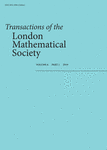
Transactions of the London Mathematical Society
Pioneering Research for the Next Generation of MathematiciansTransactions of the London Mathematical Society is a prestigious journal published by WILEY, dedicated to advancing the field of mathematics across various sub-disciplines. With its commitment to Open Access since 2014, the journal ensures that research findings are widely disseminated and accessible to a global audience, enhancing collaboration and innovation in the mathematical community. Based in the United States, this journal enjoys a prominent position within the academic landscape, evidenced by its Q1 ranking in the 2023 Mathematics (miscellaneous) category and its ranking of 181 out of 399 in the General Mathematics category on Scopus, placing it at the 54th percentile. The journal publishes high-quality, peer-reviewed research articles and surveys that aim to foster advanced study and discussion in mathematical sciences, making it an invaluable resource for researchers, professionals, and students alike. With a focus on original research and significant contributions, the Transactions of the London Mathematical Society continues to play a crucial role in the evolution of mathematical inquiry.